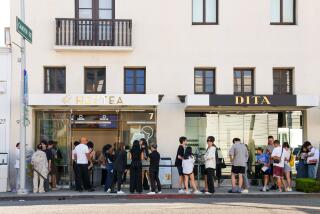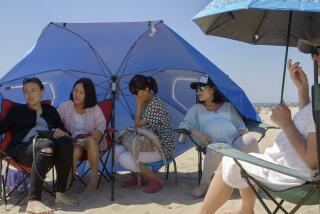Trying to Mix Business, Pleasure : Chinese Managers Visit Southland Hoping to Get Ideas, Make Friends
- Share via
Liu Ying Di would like to kick back and share a few beers--Chinese light beers--with some American businessmen and talk shop.
That would accomplish two things for Liu, vice director of the Qingdao Brewery, a Chinese firm that exports 70% of its production:
First, he would have a light beer to sell to Americans--a lack in his company’s product line that he will try to remedy the minute he gets back to China after living in Alhambra for the past five weeks.
Second, it would mean he was on hanging-out-together terms with a bunch of American business executives, a goal he is unhappy he hasn’t met by now.
Liu and other Chinese students in a business management course conducted by the Pacific Rim Institute of California State University, Los Angeles, complained that they have not met enough American business executives. They say they lack the kind of informal socializing with American counterparts they feel is vital to expanding their businesses in the United States.
The 40 Chinese managers--president, vice presidents or directors of Chinese firms--are part of an ongoing series of programs offered by the U.S. organizers under contract with Hua Yang Technology & Trade Corp., a state-owned enterprise. This was the first group to go through the program, organized by Asia System Media, of Montebello, and the Pacific Rim Institute of Cal State Los Angeles.
“One of the purposes of our coming here was to make friends with the American business community,” said He Yi Zhao, general manager of the Shanghai New Asia Group Ltd., which he said has 300 hotels and 2,000 restaurants. “We do not feel we can do business here without knowing the social ways of American business.”
Plans More Meetings
The organizers of the course have set up visits to tourist attractions, such as Disneyland, to pass the time in the evening and on weekends, said interpreter Huang Xiaopo, deputy director of the 300,000-member All China Journalists Assn.
Asia System Media President Albert Lai said he will arrange more meetings with American executives for future groups--another is expected in September--but that the corporation in Beijing, which contracts with American organizers for the group sessions, frowns on excessive socializing. “The ministry wants the students to spend more time in class, but the students want to spend more time making friends, like students everywhere,” Lai said.
Leonard Steinberg, director of the Pacific Rim Institute, said the institute had arranged for the executives to visit oil refineries, steel companies, banks and accounting firms.
The institute provided classes in topics such as marketing and production, taught by business professors from the University of Southern California and Cal State campuses at Los Angeles, Long Beach and Dominguez Hills.
Under new Chinese economic policies, “government administrators take care of general policy decisions, but enterprise must do its own marketing,” said Liu Jian, an engineer for a chemical plant and a deputy to the National People’s Congress. “Enterprise must pay its own losses, and may keep most of its profits except for taxes. We are trying to bring to the fore the initiative of enterprise and relieve enterprise of many government burdens.”
Will Launch Light Beer
“Anybody can set up a restaurant now,” said Ziang Jun Xian, vice president of Beijing Catering & Service Industries, which claims more than 70,000 employees in more than 3,000 restaurants, hotels and laundries.
“You just register with the neighborhood business management bureau and go ahead. There are over 5,000 restaurants in Shanghai and in Beijing 8,000, usually not very big.”
The enterprise that he intends to launch as soon as possible is a light beer, said Liu, the brewery executive, who at 32 is the youngest member of the group.
Qingdao began selling its beer in the United States in 1972, he said, but as recently as 1978 was selling only 20,000 cases annually. A new American dealer was found in 1978, and since then sales have risen to 1 million cases, about 10% of the brewery’s output.
“Our brewery was built by Germans, and so the beer is the type suitable to American tastes,” he said, “but now that I have lived in America and seen the popularity of light beer here, I can see we must produce a light beer to compete in this market.”
The executives collectively shook their heads when asked about Japanese-American trade.
“You gave them too much,” said Liu Jian, the engineer. “America is losing its grip in dealing with the Japanese because the Americans gave them too many advantages. We have a long history of dealing with Japan and we know the great lesson, that you must be very careful in dealing with the Japanese.
“The problem in our dealing with your countries is that the Americans know too little about China, and the Japanese know too much,” he said, drawing rueful laughter from the group.
The one woman in the group is Huang, who explained that she learned English in a special school, although her studies were interrupted during the cultural revolution.
Isn’t it a long way from being a Red Guard to fostering the development of a market-oriented, profit economy?
“It is like the hippies in the West,” who have since become executives “who drive Porsches,” she said, pointing out the English word she had learned for people like herself.
“I am a Chinese yuppie.”
More to Read
Inside the business of entertainment
The Wide Shot brings you news, analysis and insights on everything from streaming wars to production — and what it all means for the future.
You may occasionally receive promotional content from the Los Angeles Times.










